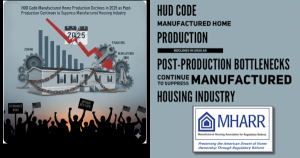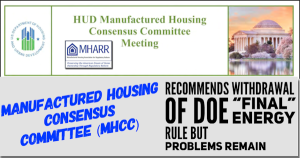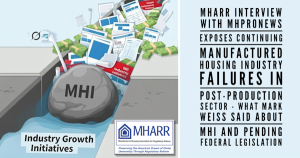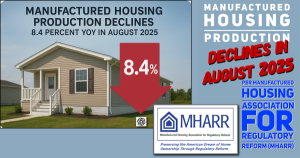Statutory Manufactured Housing Consensus Committee (MHCC) Recommends HUD Rejection of DOE Manufactured Housing Energy Rule
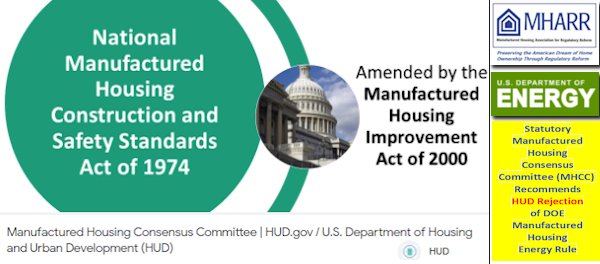
The statutory Manufactured Housing Consensus Committee (MHCC), at the conclusion of its November 15-17, 2022 meeting in Washington, D.C., to further consider the “alignment” of the HUD Code Federal Manufactured Housing Construction and Safety Standards (FMHCSS) with the U.S. Department of Energy (DOE) final energy conservation standards for manufactured housing adopted on May 31, 2022, has approved multiple recommendations for submission to HUD. The most significant of these recommendations are consistent with and reflect actions that MHARR urged the Committee to take in written comments filed on November 9, 2022. (See, Attachment to MHARR Memorandum dated November 14, 2022 — “MHARR Comments Oppose Incorporation of DOE Energy Standards Within the HUD Code”). They also reflect MHCC consideration of – and agreement with – additional specific points raised by MHARR as a participant in the October and November 2022 MHCC in-person meetings.
MHARR, in its November 9, 2022 comments, urged the MHCC to:
- “Reject the incorporation of the DOE May 31, 2022 final manufactured housing standard within the FMHCSS;”
- “Adopt a statement rejecting the May 31, 2022 final DOE manufactured housing energy standard as being inappropriate for and destructive of the affordability of manufactured housing;” and
- “Assert that HUD adoption of any modified or altered DOE manufactured housing energy standard must be based on a full and valid analysis of all applicable costs … as well as compliance with all applicable procedural requirements of federal law.”
Consistent with these key substantive and procedural points – which could directly impact any industry legal action against the DOE final standards – the MHCC took final action to reject the wholesale incorporation of the DOE final rule into the FMHCSS standards as proffered in advance by HUD. Instead, it approved, among other things, comments to HUD stating, in relevant part:
- “The MHCC has reviewed the DOE Final Rule and has determined [that] DOE circumvented the standards development process prescribed in [the Energy Independence and Security Act of 2007] EISA which requires cost justification and consultation with HUD;”
- “DOE provided an energy conservation standard which was based on site-built construction and applied it to a performance-based national code. If adopted as written, the final rule would adversely impact the entire Manufactured Housing program and cost increases associated with compliance would reduce prospective purchasers (especially minorities and low-income consumers) from durable, safe, high quality and affordable housing;” ***
- “The MHCC previously recommended that DOE include the substantial cost of testing, enforcement, and regulatory compliance in its costing analysis. The final rule did not consider these costs….”
- “The MHCC has a statutory obligation to consider the cost impacts of all recommended changes to the MHCSS and preserve affordability to increase American home ownership and this obligation is reflected in the recommended changes.”
- “The MHCC expects, in accordance with normal practice, the recommendations contained in this document will be subject, as required in 42 USC 5403, to publication as a proposed rule and full notice and comment rulemaking in accordance with the 1974 Act as amended.”
(Emphasis added). In substance, each of these points align with the statements and positions sought by MHARR in its written comments.
In addition to these “general” conclusions and recommendations with respect to the DOE May 31, 2022 final standard, the MHCC also considered and recommended to HUD, proposed “incremental” revisions to the FMHCC energy standards developed by the Manufactured Housing Institute (MHI). Whether these proposals are – or will ultimately be – acceptable to MHARR as proposed modifications to the FMHCSS standards, will depend upon member input and further cost-benefit and practicability analysis conducted by the Association as part of the HUD rulemaking process, as that process moves forward.
For present purposes, however, the recommendations adopted by the MHCC accomplish several important MHARR goals. First, rejection of the DOE final rule, if accepted by HUD, will prevent the enforcement of that rule, as currently drafted, through the HUD Part 3282 enforcement system for FMHCSS standards, with no alternative DOE enforcement system in place. Second, rejection of the DOE standard by the MHCC can be offered as evidence of DOE’s failure to comply with EISA on both substantive and procedural grounds in any industry legal action to stop the DOE rule. Third, notice and comment procedures for any variant of the DOE rule will, in all likelihood, extend beyond the May 31, 2023 scheduled implementation date for the DOE final standard, meaning that enforcement of the DOE standard may ultimately be delayed, leaving more time to seek remedies to stop the DOE standard.
With these recommendations submitted, it will now be up to HUD to fully comply with its governing federal law to ensure that manufactured housing consumers and especially lower-income families, are not adversely impacted by DOE’s energy standard.
Finally, with all of these pieces in place, the industry is in a good position to initiate timely legal action against DOE to seek an injunction against the imposition of its final May 31, 2022 manufactured housing energy standards.
MHARR will continue to actively participate in the HUD/MHCC process while aggressively opposing the egregious and baseless DOE manufactured housing energy standards.
cc: Other Interested HUD Code Manufactured Housing Industry Members
Manufactured Housing Association for Regulatory Reform (MHARR)
1331 Pennsylvania Ave N.W., Suite 512
Washington D.C. 20004
Phone: 202/783-4087
Fax: 202/783-4075
Email: MHARR@MHARRPUBLICATIONS.COM
Website: manufacturedhousingassociation.org
The statutory Manufactured Housing Consensus Committee (MHCC), at the conclusion of its November 15-17, 2022 meeting in Washington, D.C., to further consider the “alignment” of the HUD Code Federal Manufactured Housing Construction and Safety Standards (FMHCSS) with the U.S. Department of Energy (DOE) final energy conservation standards for manufactured housing adopted on May 31, 2022, has approved multiple recommendations for submission to HUD. The most significant of these recommendations are consistent with and reflect actions that MHARR urged the Committee to take in written comments filed on November 9, 2022. (See, Attachment to MHARR Memorandum dated November 14, 2022 — “MHARR Comments Oppose Incorporation of DOE Energy Standards Within the HUD Code”). They also reflect MHCC consideration of – and agreement with – additional specific points raised by MHARR as a participant in the October and November 2022 MHCC in-person meetings.
MHARR, in its November 9, 2022 comments, urged the MHCC to:
- “Reject the incorporation of the DOE May 31, 2022 final manufactured housing standard within the FMHCSS;”
- “Adopt a statement rejecting the May 31, 2022 final DOE manufactured housing energy standard as being inappropriate for and destructive of the affordability of manufactured housing;” and
- “Assert that HUD adoption of any modified or altered DOE manufactured housing energy standard must be based on a full and valid analysis of all applicable costs … as well as compliance with all applicable procedural requirements of federal law.”
Consistent with these key substantive and procedural points – which could directly impact any industry legal action against the DOE final standards – the MHCC took final action to reject the wholesale incorporation of the DOE final rule into the FMHCSS standards as proffered in advance by HUD. Instead, it approved, among other things, comments to HUD stating, in relevant part:
- “The MHCC has reviewed the DOE Final Rule and has determined [that] DOE circumvented the standards development process prescribed in [the Energy Independence and Security Act of 2007] EISA which requires cost justification and consultation with HUD;”
- “DOE provided an energy conservation standard which was based on site-built construction and applied it to a performance-based national code. If adopted as written, the final rule would adversely impact the entire Manufactured Housing program and cost increases associated with compliance would reduce prospective purchasers (especially minorities and low-income consumers) from durable, safe, high quality and affordable housing;” ***
- “The MHCC previously recommended that DOE include the substantial cost of testing, enforcement, and regulatory compliance in its costing analysis. The final rule did not consider these costs….”
- “The MHCC has a statutory obligation to consider the cost impacts of all recommended changes to the MHCSS and preserve affordability to increase American home ownership and this obligation is reflected in the recommended changes.”
- “The MHCC expects, in accordance with normal practice, the recommendations contained in this document will be subject, as required in 42 USC 5403, to publication as a proposed rule and full notice and comment rulemaking in accordance with the 1974 Act as amended.”
(Emphasis added). In substance, each of these points align with the statements and positions sought by MHARR in its written comments.
In addition to these “general” conclusions and recommendations with respect to the DOE May 31, 2022 final standard, the MHCC also considered and recommended to HUD, proposed “incremental” revisions to the FMHCC energy standards developed by the Manufactured Housing Institute (MHI). Whether these proposals are – or will ultimately be – acceptable to MHARR as proposed modifications to the FMHCSS standards, will depend upon member input and further cost-benefit and practicability analysis conducted by the Association as part of the HUD rulemaking process, as that process moves forward.
For present purposes, however, the recommendations adopted by the MHCC accomplish several important MHARR goals. First, rejection of the DOE final rule, if accepted by HUD, will prevent the enforcement of that rule, as currently drafted, through the HUD Part 3282 enforcement system for FMHCSS standards, with no alternative DOE enforcement system in place. Second, rejection of the DOE standard by the MHCC can be offered as evidence of DOE’s failure to comply with EISA on both substantive and procedural grounds in any industry legal action to stop the DOE rule. Third, notice and comment procedures for any variant of the DOE rule will, in all likelihood, extend beyond the May 31, 2023 scheduled implementation date for the DOE final standard, meaning that enforcement of the DOE standard may ultimately be delayed, leaving more time to seek remedies to stop the DOE standard.
With these recommendations submitted, it will now be up to HUD to fully comply with its governing federal law to ensure that manufactured housing consumers and especially lower-income families, are not adversely impacted by DOE’s energy standard.
Finally, with all of these pieces in place, the industry is in a good position to initiate timely legal action against DOE to seek an injunction against the imposition of its final May 31, 2022 manufactured housing energy standards.
MHARR will continue to actively participate in the HUD/MHCC process while aggressively opposing the egregious and baseless DOE manufactured housing energy standards.
cc: Other Interested HUD Code Manufactured Housing Industry Members
Manufactured Housing Association for Regulatory Reform (MHARR)
1331 Pennsylvania Ave N.W., Suite 512
Washington D.C. 20004
Phone: 202/783-4087
Fax: 202/783-4075
Email: MHARR@MHARRPUBLICATIONS.COM
Website: manufacturedhousingassociation.org

